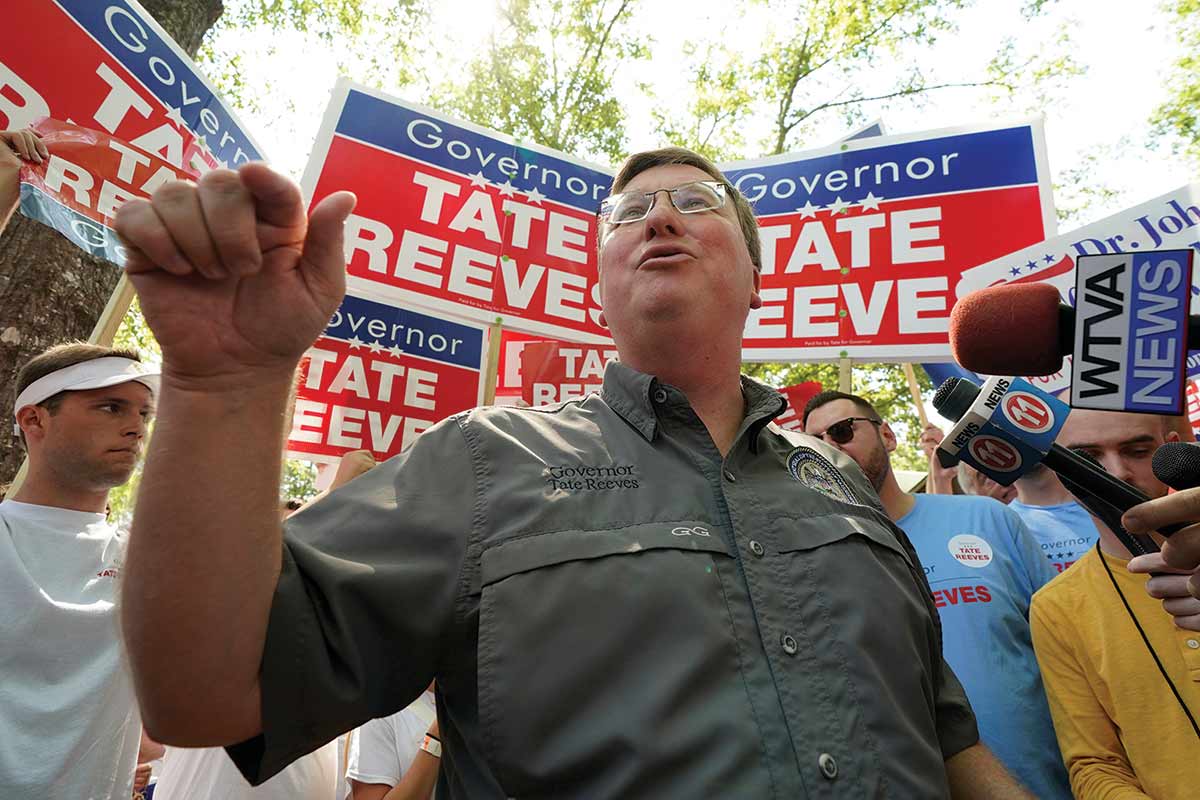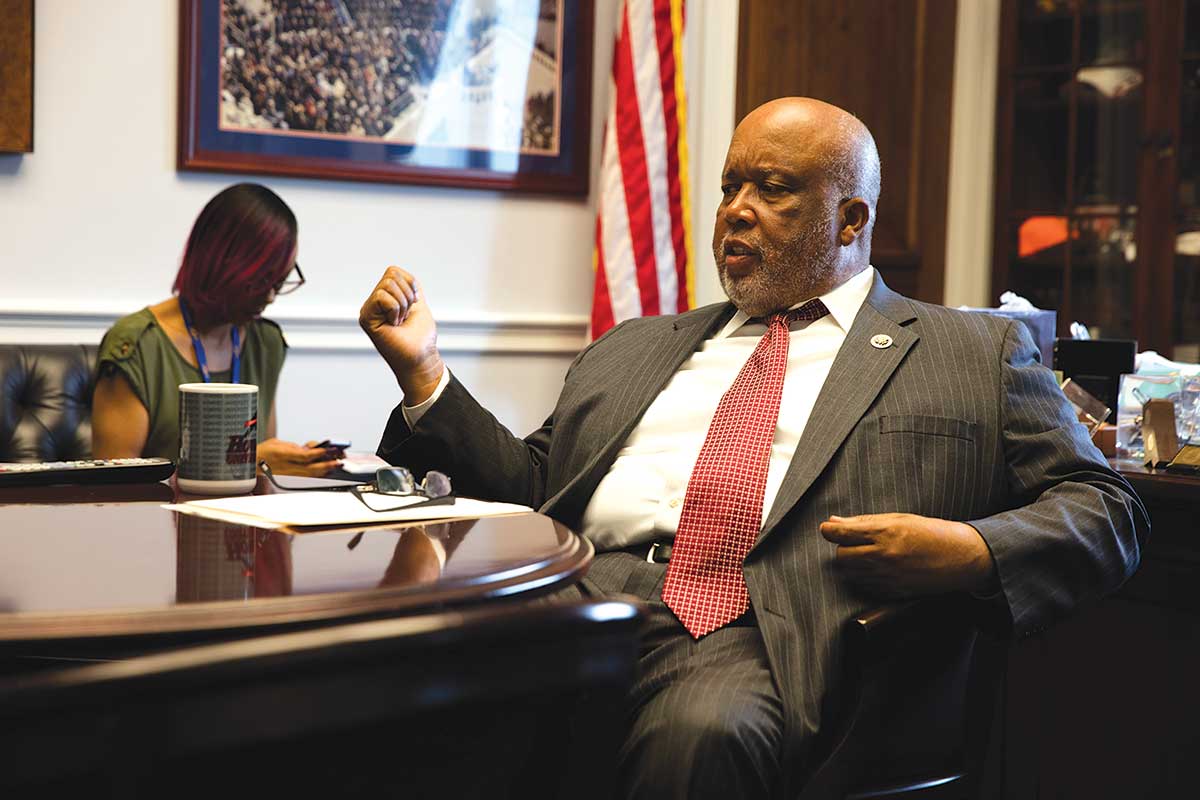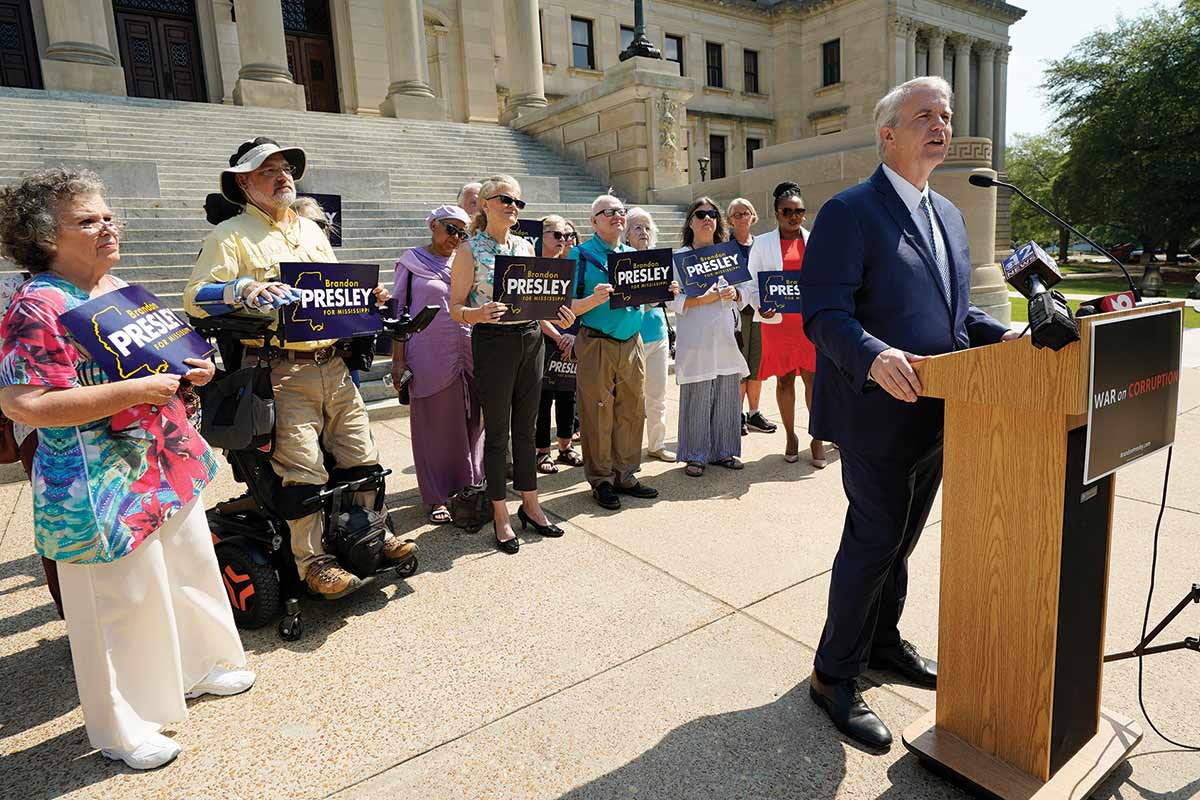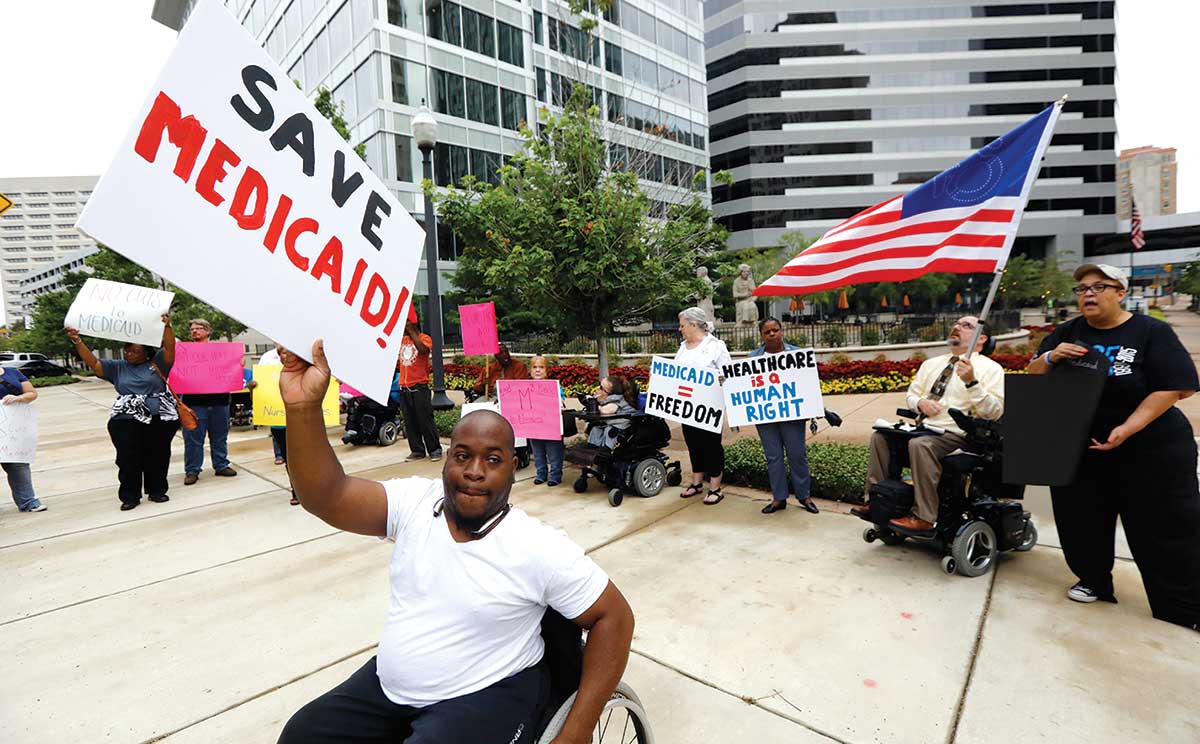Can Brandon Presley Shake Up Mississippi Politics?
The second cousin of Elvis Presley is running for governor in a state where Democrats hardly get elected.

Does a 46-year-old self-described “FDR Democrat” stand a chance of being elected governor in the historically conservative and currently Republican state of Mississippi? On the surface, the question seems absurd. Republican Donald Trump carried the state by 16 points in 2020. Both of its US senators are Republicans, as are three of its four US representatives—the worst ratio for Democrats since the end of the Reconstruction era in the 1870s. The Democratic Party holds less than one-third of the seats in the state Legislature, and Mississippi hasn’t elected a Democratic governor in the 21st century. Against a credible Republican, it’s tough to imagine how a Democrat would be able to mount a competitive race. But the scandal-plagued incumbent, Tate Reeves, who has earned the derogatory nickname “Tater Tot,” seems to have offended just about everyone in the Magnolia State. And his challenger, Brandon Presley, isn’t just any Democrat. He’s a second cousin of a singer from Tupelo named Elvis. He’s also an economic populist with deep roots in rural northern Mississippi, as well as a history of winning elections for local and state office—he’s been on the Public Service Commission since 2008, where he’s established a record of fighting on behalf of working families—and some socially conservative stands that analysts imagine could appeal to swing voters.
Campaigning across Mississippi, Presley promises to deliver “a clean, transparent state government that’s on the side of the people and not just folks who can write a big, fat campaign check.” Specifically, he proposes to expand Medicaid and save rural hospitals, “ax” regressive grocery taxes, and break the grip that corporate special interests have on the state government. Those positions, and a rocking-and-rolling campaign style that has drawn more attention than usually goes to Mississippi Democrats, appear to have turned an uphill run into what polls have begun to portray as a competitive race: Presley is shown to be narrowly ahead or narrowly behind, but always in the running. And he’s just getting started. As of late summer, the candidate has touched every corner of the state on a Bible-quoting, “power to the people” crusade to build a multiracial coalition of working-class voters that could transform the politics of Mississippi, which hasn’t backed a Democrat for president since Jimmy Carter narrowly prevailed in 1976.
In a state that Politico describes as “a conservative stronghold where the GOP is composed almost exclusively of white voters, and the Democratic Party of Black voters,” Presley hopes to draw some working-class white voters back to the Democratic fold. But he’s blunt about the importance of generating a historic turnout among Black residents, who make up roughly 38 percent of the state’s population—the largest proportion in the country. Presley’s effort to mobilize Black voters is vital for a Democrat running in a state where segregationist Democrats once practiced the most brutally racist politics in the nation, and where Republicans continue to engage in dog-whistle tactics that are frequently identified as evidence of their white supremacist inclinations. Reeves, who once appeared before a gathering of the Sons of Confederate Veterans surrounded by Confederate battle flags and other symbols of the Southern states that rebelled against efforts to end slavery, regularly gets called out for his attacks on the majority-Black capital city of Jackson. When the governor led the charge to take away policing powers from elected officials in the city earlier this year, Jackson Mayor Chokwe Antar Lumumba said, “I think we would be less than honest if we called it anything but racist.”
Presley stands in stark contrast to Reeves on the issues and in his approach. The Democrat embraces the legacy of the civil rights movement; is supported by prominent Black leaders in the state, such as US Representative Bennie Thompson; and shows up and speaks frankly about the support he hopes to generate in majority-Black counties that are often overlooked by the candidates of both parties. During a recent visit to Tunica County, Presley told a crowd at the St. Luke Missionary Baptist Church: “Look, I’m white, and I’m country, and I can’t do anything about that. You know, that’s the facts. But what I can do is get up here today and send a signal from the governor’s office that we work for everybody.” The sincerity of the message and the consistency of the outreach struck a chord with Thompson, who had previously distanced himself from Democratic nominees for governor. This year, he’s been warmly endorsing Presley, with whom he has worked closely over the years on issues such as Jackson’s water-quality crisis, calling the public service commissioner “a leader who will put the people first and stamp out corruption, not embrace it.”
That focus on corruption is central to the state Democratic Party’s hope of turning a broad cross-section of Mississippians against Reeves, who served two terms as lieutenant governor before becoming governor. “Tate Reeves has spent his whole political career as the chief cheerleader for the good old boys’ club. That corrupt bunch of grifters have run this state long enough. It’s time to send them and their best buddy, Tate Reeves, packing,” says Presley, who never misses an opportunity to mention the ethical troubles that have swirled around his rival. Those troubles include the governor’s reported ties to long-simmering scandals involving the misappropriation of some $94 million in state Department of Human Services funding. State and federal investigations have focused on the mishandling of federal funds—primarily Temporary Assistance for Needy Families block grant money—in schemes that have enriched wealthy white Mississippians such as former Green Bay Packers quarterback Brett Favre. “According to the state audit and a civil lawsuit, Favre was paid $1.1 million from TANF funds for speeches the auditor says he never made,” explained a 2022 assessment of the situation by ESPN. “He eventually paid the money back, but the auditor has demanded he also pay $228,000 in interest. Prevacus, a company developing a concussion drug in which Favre is the top investor and stockholder, also received TANF funds.”
Reeves, a professional financial analyst, was lieutenant governor during the years when the TANF money was flowing to Favre and others. The governor denies that he was involved in any wrongdoing. But Paul Lacoste, the governor’s personal trainer, received $1.3 million in money that was supposed to benefit needy families. Text messages obtained by Mississippi Today, a watchdog publication, revealed that “John Davis, the former head of the state agency that administered the funds, told his subordinates that Reeves played at least some role in Lacoste receiving the funds.”
Even in a state that’s had its share of scandal over the years, Presley’s determined focus on Republican wrongdoing has put Reeves and his party on the defensive—so much so that Sierra Club executive director and former national NAACP president and CEO Ben Jealous, who has deep experience working in Southern states, is saying that Democrats could see a “Mississippi miracle” this fall.
For all its down-home trappings and Elvis references, Brandon Presley’s campaign represents a break from the past for white Mississippi Democrats. The candidate has been willing to address the systemic inequities that have long harmed communities of color, along with under-resourced and underserved populations of all races. And he’s assembled a staff that is prepared to deliver on that message. Presley has recruited a number of veterans from the campaigns of Michigan Governor Gretchen Whitmer and Georgia gubernatorial candidate Stacey Abrams, many of whom are skilled at boosting turnout among Black voters and college students of all backgrounds. Mississippi native Karen Hinton, a former press aide for Democratic National Committee chair Ron Brown who has long been active in the politics of her home state, argued in a Mississippi Free Press column that “Brandon Presley could win his upcoming race for Mississippi governor by turning out Democratic voters who have not pulled the lever or marked their ballots in years, as well as those who may have never voted.” The Presley campaign’s focus on maximizing Black voter turnout from Jackson to the Delta, along with the hope that pocketbook appeals can break loose a portion of the state’s working-class white voters, has the candidate telling Mississippians, “Together we can win this race and move our state forward.”

Gubernatorial candidates, even in tough races, can be counted on to predict victory. But Presley has Mississippi Democrats, who are about as beaten down as any partisans in the country, allowing uncharacteristic notes of optimism to enter their political conversations. “He’s got a very good chance,” says Richard Howorth, speaking with an almost scolding seriousness on a muggy morning in late May. Howorth—who, like Presley, is a former mayor of a small northern Mississippi city, and who was once a Barack Obama appointee to the board of the Tennessee Valley Authority, which serves part of Mississippi—was standing beside the checkout counter of Square Books, the literary oasis he operates across from the Lafayette County Courthouse in the college town of Oxford. He acknowledged that political observers are generally skeptical about Democratic prospects in Southern and border states where the GOP long ago took control. That skepticism shades into open disbelief when it comes to Mississippi, but Presley is forcing political observers to take another look. “I know that there are a lot of people who think Democrats will never win in Mississippi,” Howorth says. “But Brandon Presley is convincing folks that it’s possible.”
One aspect of Presley’s viability has to do with the fact that a good many Mississippians in both parties share a view of Reeves that was summed up by the veteran Mississippi political journalist and author Curtis Wilkie: “He’s a complete jackass.” But another part has to do with the Democrat’s style. He’s not quite Elvis, but Brandon Presley has a flair for getting people excited.
The candidate’s approach is rooted in grassroots politics of a sort that has disappeared in many parts of the country—Howorth calls it “old-fashioned Southern populism, but without the bigotry.” The candidate shows up in the crossroads towns that he refers to as “little dots on the map just struggling to stay there.” And he commiserates with people who have grown disengaged from both parties in a state that routinely has the worst poverty rate, the lowest household income level, and the shortest life expectancy in the nation. For his part, Presley tells stories about his own hardscrabble upbringing. In his childhood home, he says, “we could see through the floor, straight down to the dirt.” But he’s doing more than writing the lyrics for a country song. He’s making pledges to stand up to corporate special interests and rate-gouging insurance companies, to accept Medicaid funding in order to expand access to health care, and to keep rural hospitals open at a time when the Center for Healthcare Quality and Payment Reform estimates that 27 of Mississippi’s 74 rural hospitals are at risk of closing. The focus on health care is critical, as almost one in seven Mississippians say they don’t seek medical care because of the cost. Surveys by the Commonwealth Fund have determined that as many as 230,000 Mississippians would sign up for Medicaid if the state expanded benefits.
Presley’s robust candidacy has made the governor’s race in Mississippi one of the most intriguing contests in an off-year election cycle that will provide important signals about where the country is headed as the 2024 presidential election approaches. National media outlets are already engaged in obsessive coverage of what they anticipate will be a repeat contest between President Joe Biden and the legally embattled Republican he displaced in 2020. Yet this fall will see elections for the governorships in three Southern and border states, all of which are seen as Trump country but have more nuanced politics than surface impressions might suggest. Two of them currently have Democratic governors. In Louisiana, where the socially conservative Democratic Governor John Bel Edwards is term-limited, Republican Attorney General Jeff Landry and former Louisiana Department of Transportation and Development secretary Shawn Wilson, a Democrat who has the backing of Edwards and US Representative Troy Carter, are the top contenders going into a crowded October 14 open primary that will determine whether Landry and Wilson face each other in a November 18 runoff. Polls generally give Landry the upper hand. But in Kentucky, popular Democratic Governor Andy Beshear led Republican challenger Daniel Cameron by 10 points in a Public Opinion Strategy poll in late June. Both parties plan to pour major resources into the Kentucky contest this fall and also into the fight for control of Virginia’s legislative chambers.
Popular
“swipe left below to view more authors”Swipe →Still, Presley’s campaign is one that could force Democrats to think more broadly about where their party is competitive—and, perhaps, to revisit the “50-state strategy” that former Democratic National Committee chair Howard Dean popularized in the mid-2000s. Dean argued then that the party needed to compete everywhere—not just to win but to achieve governing majorities that could transform lives. “Given where the Republican Party has gone—where they fundamentally don’t believe in democracy, and where they are working against the interests of the vast majority of Americans—it’s simply better to have a Democrat in office,” Dean told me when we discussed the Mississippi race. “The challenge is that Democrats have had a hard time in some of these states for so long that a lot of people have just given up hope. That makes it harder to raise money, harder to get turnout up.”
Dean’s concern is shared by Ruth Ball, the president of the NAACP branch in northern Mississippi’s Lafayette County, where she also serves as vice chair for the local Democratic Party. “A lot of people just feel that their vote doesn’t matter,” Ball said as she described Mississippi’s transition from a state run by Jim Crow segregationist Democrats to one where Trump Republicans are in charge. “That creates so much apathy. Too many people who are on the Democratic side just don’t vote. It’s just become harder and harder for Democrats to win.”

In the 2022 midterm elections, Mississippi had the lowest turnout in the nation—roughly 32 percent. That’s not an accident. Nearly six decades after the Voting Rights Act became law, Mississippi’s election systems are defined not only by the ghosts of the state’s Jim Crow past, but also by the contemporary manifestations of a racist voter suppression strategy that national Republicans have made their calling card. Plenty of states have seen “barriers” to voting erected by GOP governors and legislators. But Mississippians face what local activists argue are the most daunting roadblocks in the country. In addition to an aggressive felony disenfranchisement law, which in 2020 denied voting rights to 16 percent of the adult Black population in the state, Mississippi has one of the strictest voter ID laws in the country and no clear system for early voting. “Mississippi is very behind,” says Nsombi Lambright-Haynes, the executive director of One Voice in Mississippi, a nonprofit group that, among its other social justice work, promotes voter participation in marginalized and vulnerable communities. “Mississippi does not have online voter registration; many individuals do not receive their registration card, which tells them where to vote; we also have an antiquated absentee ballot process.”
While the decay of democratic processes is generally bad for Mississippians, it’s been especially rough on Democrats. This has created a situation where, in the words of Curtis Wilkie, Mississippi Democrats “are used to losing elections but stick around on principle.”
That’s not unheard of in the United States. But the fact that the odds are stacked against Democrats definitely impacts voter turnout, Ball says. “You just have to understand that, at this point, to be a Democrat in Mississippi is a disadvantage in itself. You used to have to run as a Democrat. You had no choice—if you weren’t a Democrat, you couldn’t get elected,” she explains, recalling when Jim Crow Mississippi was part of the Democratic Party’s “solid South.” “Now, you can hardly get elected as a Democrat.”
Yet Ball and her allies in the Lafayette County Democratic Party aren’t giving up. They’re excited about Presley’s candidacy and have their own slate of local candidates this year, including Don Mason, a retired University of Mississippi School of Law professor and the former associate director of the National Center for Justice and the Rule of Law, who is running for a county supervisor post. Why take on a local race as a Democrat in a county where Republicans have been surging and where even Mason’s friends have encouraged him to avoid the “D” label and run as an independent? “When it came down to it,” Mason says, “I decided I could not turn my back on the Democratic Party…. If we turn away and just let things collapse, in these times, I really do think we could lose everything.” Mason’s point is echoed by Howard Dean. The former DNC chair says that wanting Democrats to do well in Mississippi is not merely a matter of feel-good partisanship: “I just don’t know how long it’s going to take for Democrats in Washington to recognize that they can’t win the kind of majorities they need in Congress without starting to win in some of these states where the party has been losing ground in recent years. You have to get people elected to the state Legislature and to state offices, because those are the people who eventually run for the House and the Senate. Getting things right in the states is essential to getting it right in Washington.”
The whole “red state” versus “blue state” calculus has become so entrenched that presidential elections are now decided in a handful of so-called “battleground states,” while the rest are simply presumed to be locked in for one party or the other. The campaigning, organizing, and funding that defines a presidential race will go into those competitive states—such as Arizona, Georgia, Michigan, Nevada, Pennsylvania, and Wisconsin —and it’s the same with fights for key US Senate seats. The remaining states are generally neglected by the weaker party, with candidates often left to their own devices and political will. We’re often told that decisive, truly national victories—like the wins that Franklin Roosevelt secured in the 1930s and that Lyndon Johnson had in 1964—are a thing of the past. Unfortunately, if that’s the case, so, too, are the prospects for the sort of governing majorities that allowed FDR to deliver the New Deal and LBJ to pursue the Great Society.

Brandon Presley likes to refer to himself as an “FDR Democrat,” which is not unheard of in the South. But he also talks up LBJ’s seminal accomplishments, especially the Voting Rights Act, and he quotes from speeches the 36th president delivered amid the civil rights struggles of the 1960s. While Roosevelt won Mississippi four times, Johnson lost the state in 1964, after he signed the Civil Rights Act in July of that year and told White House press secretary Bill Moyers, “I think we just delivered the South to the Republican Party for a long time to come.” Johnson was more or less right. Of the 11 states that once formed the Democratic Party’s “solid South,” only two backed Joe Biden for the presidency in 2020: Virginia and Georgia. Those also happen to be the two Southern states that send Democrats to the Senate. Every Southern state except Louisiana and North Carolina has a Republican governor, and as Chris Kromm, the executive director of the Institute for Southern Studies, has explained, “Republicans may not have enjoyed big victories like many expected in the 2022 midterm elections, but the predicted ‘red wave’ did materialize in at least one critical arena—Southern state legislatures.” Of the 22 old “solid South” legislative chambers, Democrats hold just one: the Virginia Senate.
So what makes people think Presley could win? It’s not just those credible poll numbers. “What Brandon’s got going for him is that he has a very good record with the Public Service Commission,” Wilkie says. “That’s where the populism comes in. He has just kicked ass with the telephone companies and the utility companies on behalf of the little people. The poor people were getting screwed over by the powerful utilities, and Brandon took them on—not unlike Huey Long took on the oil companies in Louisiana.”
No less a progressive populist than former Texas agriculture commissioner Jim Hightower shares Wilkie’s assessment, describing Presley as “an unabashed working-class Democrat with a program of for-the-people reforms and an anti-plutocrat campaign for governor [who] has already pulled even with the right-wing incumbent!”
That has clearly rattled Reeves. Facing a more competitive race than anyone imagined, and conscious of the polling that shows that one in five Republicans could cross over to back Presley, the governor has been borrowing full chapters from the political playbooks of Donald Trump and Florida Republican Governor Ron DeSantis. “My friends,” Reeves told supporters in May, “this is a different governor’s campaign than we have ever seen before in our state, because we are not up against a local-yokel Mississippi Democrat. We are up against a national liberal machine. They are extreme. They are radical and vicious.”
The problem with this line of attack is that Presley doesn’t fit the stereotype that Reeves and the Republicans are trying to depict. While he’s more than ready to take on the power companies and heartless bureaucrats with a populist zeal that can echo Harry Truman at his best, it’s hard to paint this Democrat into a corner with Nancy Pelosi and Chuck Schumer. “He’s got a rural background and talks like rural people,” says Wilkie, who has known Presley for a decade. “So he can’t be branded with all that bullshit about not being from here.” It’s not just the accent; it’s what Presley says on several issues where he splits with D.C. Democrats. He’s “all in on the Second Amendment.” And when asked about abortion rights, he responds with a line that would knock him out of the Democratic primary race in any number of battleground states: “Being pro-life is not only about protecting the unborn—and I’m for that. But it’s also caring about the ones that are born, that are here, that are suffering in a rural community today in the grips of addiction.” Pinning Presley down on precisely where he stands with regard to abortion rights is tough. He says he’s “in the mainstream of Mississippi political thought on this.” But what does that mean exactly? “I believe there should be exceptions in the law for rape, incest, and the life of the mother,” he replies.
“But what about the ban, commissioner?” he was asked on WLOX-TV in Biloxi. “Can you commit to a 12-week, a 15-week ban that you would think would be appropriate in Mississippi?” “That’s up to the Legislature,” Presley responded, dodging. Instead, he called for a “pro-hospital, pro-emergency-room, pro-doctor, pro-Medicaid-expansion” agenda that would “care about families, and babies once they are born.” He also threw in a dig at his opponent: “Tate Reeves cares about you until you’re born, and then he doesn’t care anything about you after that.”
At a time when enthusiasm about protecting abortion rights has mobilized young voters and boosted Democratic fortunes even in red-tinged states like Kansas and Kentucky, Presley’s self-identification as a “pro-life” Democrat—similar to the stance of Governor Edwards in Louisiana—puts him at odds with the party’s platform and the majority of the American public, which supports the legal right to abortion in the United States. It’s also hard to imagine that committed anti-abortion voters will back the candidate over Reeves, who declares that the state will always be “a beacon on the hill, a symbol of hope for the country, and a model for the nation” when it comes to banning abortion.
The Democrats I spoke with for this story tended to disagree with Presley’s position on the issue, in some cases quite passionately. And although Pew Research Group polling shows that 59 percent of Mississippians say abortion should be illegal in all or most cases, there are plenty of pro-choice voters in the state that prompted the overturning of Roe v. Wade. Fifty-one percent of residents polled after the Dobbs v. Jackson Women’s Health Organization decision in June 2022 disagreed with the outcome, which upheld the state’s 15-week abortion ban and cleared the way for a trigger law to take effect, banning most abortions in the state two weeks after the Supreme Court issued its ruling.
Even if they disagree with Presley on some issues, however, Mississippi Democrats told me they’re enthusiastic about his candidacy.

Ball says that the critical health care issue for Mississippians of all races, but especially for Black Mississippians, is the expansion of Medicaid, which Reeves absolutely opposes and Presley absolutely supports. “That’s a no-brainer,” she says. “We are the poorest state in the union. The [Republican] attitude against the poor in this state is a real issue. And Brandon Presley is on the right side of it. He knows that Medicaid expansion has real meaning for voters. You have towns all over this state with no hospital, no doctor, no nurse. You have people who have to go 75 miles for help and then hope they’ll be accepted because they have no health insurance.” Presley zeroed in on rural health issues when he responded to Reeves’s State of the State address in January with a fiery rebuke—delivered “from inside a closed-down emergency room in a shut-down hospital” in the predominantly Black city of Newton—in which he declared:
Every time we close a rural hospital, folks have to drive farther and farther to see a doctor, and the true, sad fact is that some will die. This is the reality that Tate Reeves has chosen to put us in. Make no mistake, he has made this choice. We have a solution. By extending Medicaid to the working people of our state, we can keep hospitals across Mississippi from experiencing the same fate as this one. All Tate Reeves has to do is lift his hand, take an ink pen, and sign on a line. Instead, he lacks the backbone, and he will sit on his hands while people lose their jobs, some lose their lives, and our hospitals close. When Tate Reeves finally wakes up and asks why hospitals are closing, he should look in the mirror.
That’s just the sort of message Curtis Wilkie thinks could elect a Democrat in Mississippi. “Brandon Presley’s by far the best Democratic candidate we’ve seen running a statewide race in years,” Wilkie says. “He’s got a shot. It’s a long shot, but it’s a shot. The key is the Black vote. If the Black vote is energized, and if enough white voters decide that they’re sick of Tate Reeves, it could happen.”
And if it happens in Mississippi for Elvis Presley’s Democratic second cousin, then American politics could, in fact, be all shook up.
More from The Nation

Enough With the Bad Election Takes! Enough With the Bad Election Takes!
To properly diagnose what went wrong, we need to look at the actual number of votes cast.

No, Kamala Harris Staffers Did Not Run a “Flawless” Campaign No, Kamala Harris Staffers Did Not Run a “Flawless” Campaign
Democratic strategists are still patting themselves on the back for a catastrophic defeat.

The Courts, Trump, and Us: A Q&A With David Cole The Courts, Trump, and Us: A Q&A With David Cole
Last time, the courts were an essential checking force on the Trump administration. This time around, they may again provide a check—if we push.

Congresswoman Barbara Lee on Why Shirley Chisholm Was Right Congresswoman Barbara Lee on Why Shirley Chisholm Was Right
The California Democrat explains why, during her 25 years in Congress, it was important for her “to disrupt and dismantle and build something that’s equitable and just and right.”...




